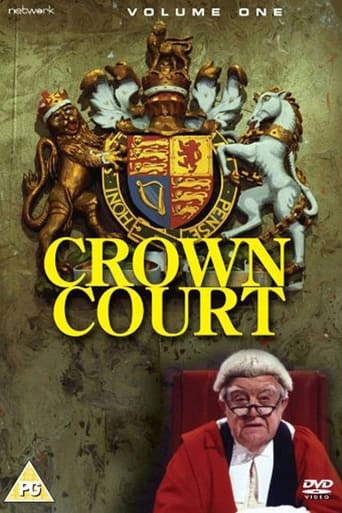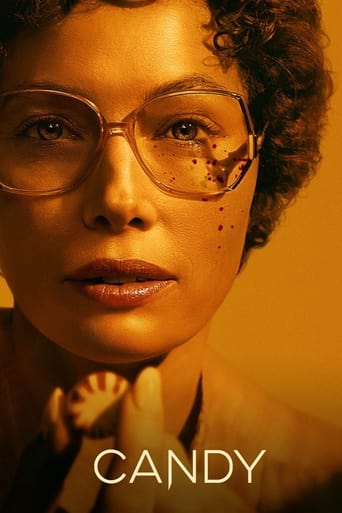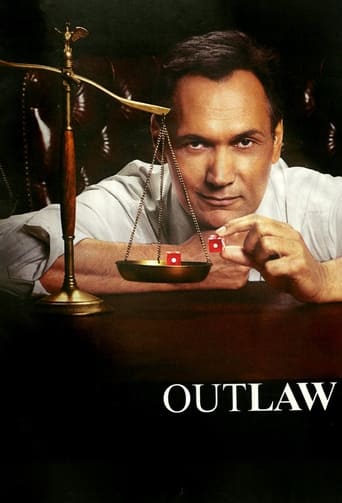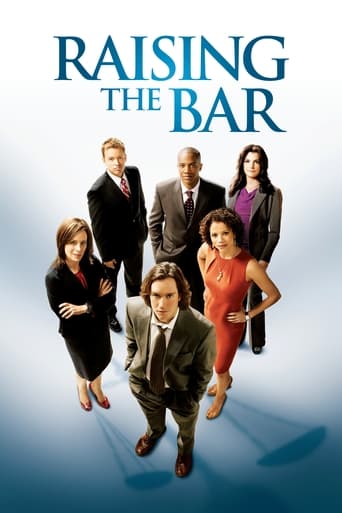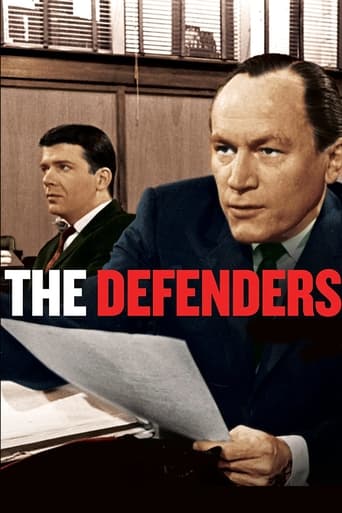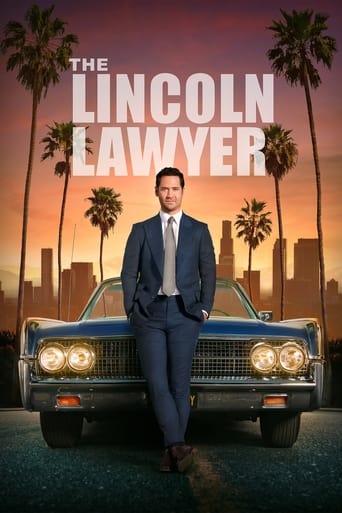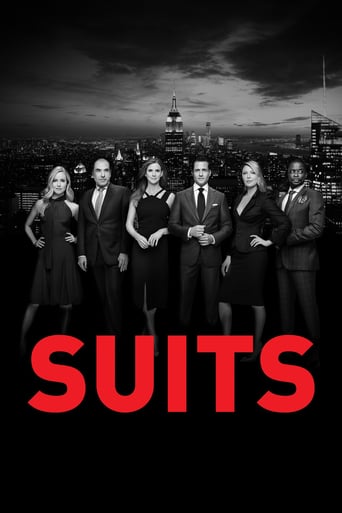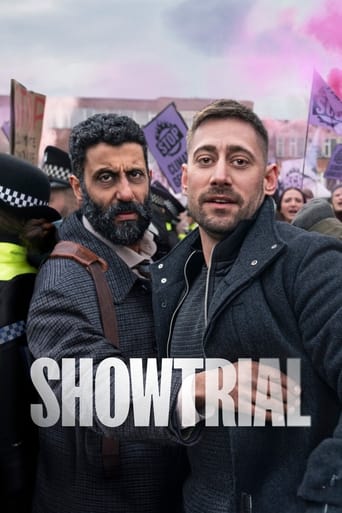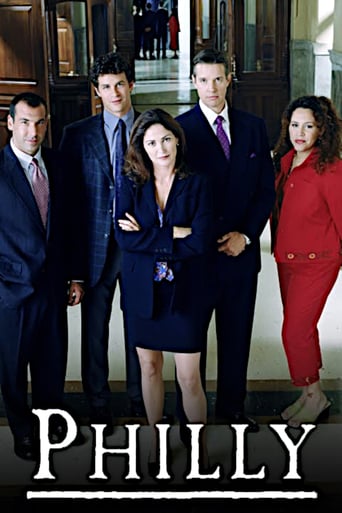Crown Court Season 2
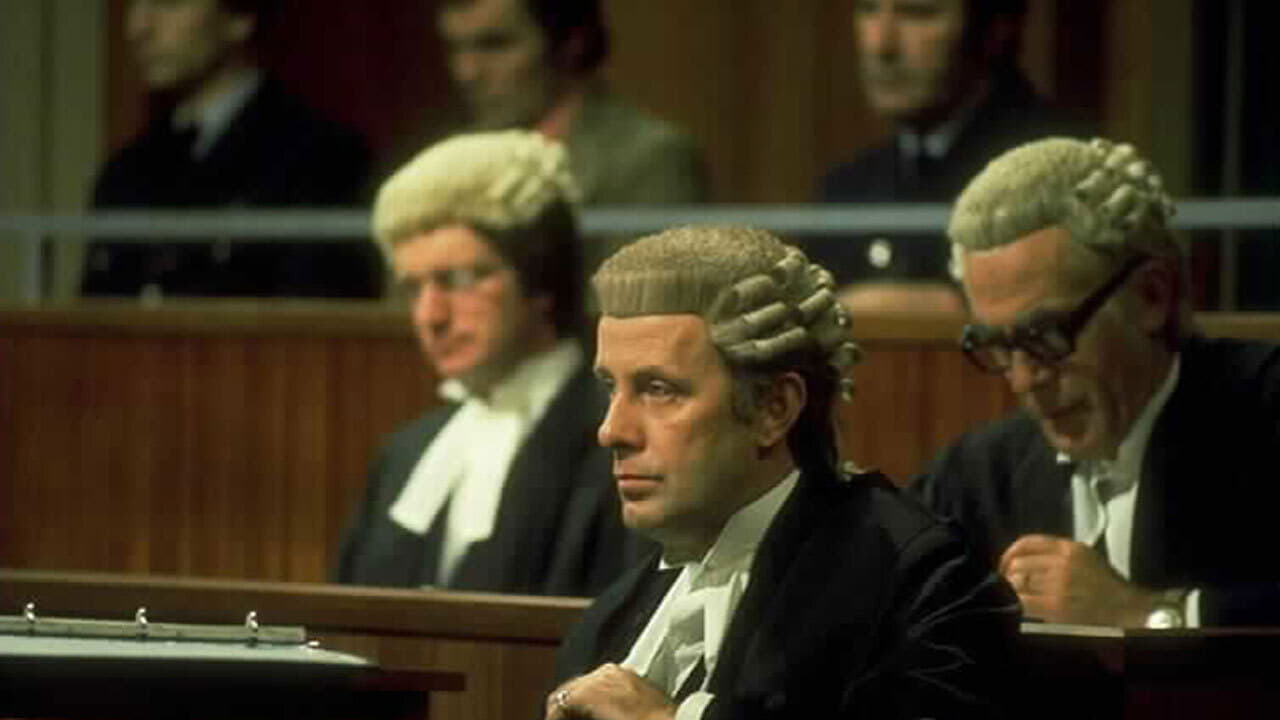
Crown Court is an afternoon television courtroom drama produced by Granada Television for the ITV network that ran from 1972, when the Crown Court system replaced Assize courts and Quarter sessions in the legal system of England and Wales, to 1984.
Watch NowWith 30 Day Free Trial!
Crown Court
1972
Courtroom drama, each case takes three episodes. At the end of the third episode, a jury of "ordinary people" comes to a verdict on the evidence presented.
Watch Trailer
With 30 Day Free Trial!
Crown Court Season 2 Full Episode Guide
A Royal Air Force squadron leader is accused of spying, a serious charge which carries life imprisonment. After crashing his car, diagrams and scribbled notes relating to a new design of bomb have been discovered in his pocket. Why did he have them? And why was a young Russian lady also in his car?
Edward Bennington's former wife Jocelyn gives evidence of his violent ranges and bouts of jealousy. Mrs. Nellie Kent tells of overhearing a telephone call on the night of the fire, where a drunken Bennington warns everyone to be careful.
Author Arthur Charles Parfitt defends "Trespass Under Arms" and denies the charge of Sedition. His aim was to highlight the effects war has on the civilian population and he denies he paid any part in Trooper William Dugdale going AWOL.
Trooper Dugdale maintains that visiting defendant Parfitt was the catalyst for his and Ronald Fisk's desertion. Major Hughes found Dugdale with Parfitt's book and confiscated. In his absence, Trooper Ronald Fisk's father takes the stand.
An acclaimed political author stands accused of the rare crime of 'incitement to disaffection', in other words, encouraging two young soldiers serving in Northen Ireland to desert the army. The prosecution claim that the idea to desert the army only entered the soldier's minds after reading his book, which criticized the way in which the British Army was behaving in the province.
Vetinary surgeon Michael Shipton confirms that the bull was fertile at the time of his sale. Barry Deeley queries his impartiality has McIver his is main client. American vet Frank Brady saw the bull service three cows but lost interest.
Gus Enderby tells how Angelos Da Costa conspired with him to rig the auction for Colonel Ulrick McIver's bull which cost £65,000. He added Da Costa and the Colonel had already agreed a price of £17,000 guineas but McIver took the money.
An Argentinian cattle rancher is suing a Scottish beef farmer after buying a bull for a record price at a Fulchester cattle auction. After the purchase, the bull was discovered to be infertile.
Dr. Eva Penny cautions that some of Robin's account maybe fantasy. Teacher Juliet Tomlin takes the stand denying they had a sexual relationship. When Robin told her he loved her she felt he overstepped the bounds of their friendship.
John Gilroy became suspicious of his son Robin when he saw a change in his character. He later learned he had become too friendly with teacher Juliet Tomlin. All attempts to end their friendship failed. Robin Gilroy gives his evidence.
School teacher Juliet Tomlin is accused of indecently assaulting one of her 15 year old pupils. She denies the charge, but it has come to light that the pupil, named in court only as Robin, recently spent two nights at the house of the teacher. Were the pair conducting an illicit affair, or did they simply become the victims of misplaced playground and staffroom gossip?
Jack Smith gives his evidence and explains how he became Leo's guardian. Smith states Leo is 9-years-old and under the age of criminal responsibility. Jimmy Dobie is called on behalf of the defence but his evidence is patchy at best.
Ernest Richards details his dispute with Smith and the boy. Jeremy Parsons QC counters that Richards has served jail time for perjury. Sgt. Barnet discusses a mallet found, at the crime scene, containing the blood of Mrs. Richards.
Jack Smith is an aging ex-convict with a string of convictions. He appears to have formed a Fagin-like relationship with a young boy, Leo Trotsky. Together, they are charged with stealing copper piping from a building and also of using this to cause actual bodily harm.
Sheena Smithson fled court following provocation from prosecutor Helen Tate, who attempted to use a violent incident while on remand. Social worker Alison James explains the extreme pressure the defendant was under from her in-laws.
Archibald Webster, of the Social Services, tells the court that Sheena had pleaded for help after admitting losing self control and hitting baby Peter. For defence, Sheena's GP, Dr. Park plays down the scale of baby Peter injuries.
A stressed mother is accused of attempting to murder her 14 month old son after he is admitted to Fulchester General Hospital with life-threatening injuries. The mother claims the injuries were sustained when the baby fell down a flight of stairs while she was busy dealing with a leaking washing machine. Charles Lotterby QC, puts the case for the defense, while Helen Tate QC prosecutes.
Henry Burnett's private secretary Vera Emberton gives her employer, an alibi, for the time of the accident while director Robert Danville claims the car was damaged earlier. However Mrs Emberton's husband breaks down under questioning.
Forensic scientist Dr. Angus Roberts confirms the paint specs, at the crash, came from a Mercedes 350SL. Henry Burnett gives evidence and denies his car knocked over the cyclist. The prosecution claim he pressured people to lie for him.
In the village of Chelton, just outside Fulchester, an elderly man is knocked off his bicycle and killed by a speeding green Mercedes convertible. The car is traced to a local wealthy businessman who now needs to explain why the car in question was taken to a local garage for repairs within hours of the incident. The accused denies causing death by dangerous driving. His defense counsel are claiming that the policeman dealing with the case held a grudge against the accused ever since a previous attempt to prosecute him on another matter proved unsuccessful.
Adelaide Vincent claims she is not a witch and only in it for the money. She also denies that she has been involved in a sex orgy claiming Anne Silk is lying to discredit her. Vincent distances herself from any curse on Charles Lake.
Anne Silk tells how maidens, of the Fulchester Witchcraft Coven, are expected to part in sex orgies. Adelaide Vincent put a life curse of Charles Laker who has since died. Rev. Felix Garmonsway gives evidence about the black arts.
Just minutes before his death through illness, Charles Laker told his doctor that he believed he had been cursed. Adelaide Vincente, the head of a little-known Fulchester witches coven, stands accused of murder. A witness from the medical profession tells the court of a growing belief among doctors that causing death and injury by witchcraft is indeed possible. For some, the trial begins to revive memories of the witchcraft trials of the seventeenth century.
Nigel Beaumont is called to give evidence and wanted to highlight the hypocrisy of the previous generation. He says Sir Richard Jeffcoate paid him bury the book while Stella Pickford wanted an authorised book of J.P. Garford.
Miss Stella Pickford, the secretary of J.P. Garford, gives evidence about her dealings with Nigel Beaumont. She claims Beaumont doctored photographs to imply an affair with her boss. She paid him £10,000 but cancelled the cheque.
An author is accused of blackmail after writing a book titled 'Just Good Friends?' in which he claimed that the close relationship between two eminent former M.P.s (one of whom has recently died) was of a homosexual nature. The author denies the charge and claims that he was offered £15000 not to publish the book by the surviving Member of Parliament, who wanted to keep the nature of the relationship quiet. The politician denies that the relationship was homosexual and claims he was blackmailed by the author. Helen Tate QC puts the case for the defense while Charles Lotterby QC prosecutes.
Christine Blandford's husband Douglas gives evidence in her defence but denies his wife knew about his affair with Margaret Lawler. However he admits that swapping partners had caused the break up of her relationship with Trevor Sanderson.
Neighbour Mr. Curtis tells of swingers party's at the Blandford home. Miss Tate counters that he only turned against the Blandford's and Sanderson's when Christine turned him down his advances. Mrs. Blandford gives evidence in her defence.
Following an argument at a summer barbecue in Fulchester, a lady guest, Mrs Lawlor, is attacked by the hostess, Mrs Blandford, with a heated kebab skewer. Mrs Blandford stands accused of malicious wounding. The accused claims that she slipped on wet grass as she was serving food and that the injuries were caused by accident. The court will hear that a series of arguments had taken place between the two women over issues such as animal rights and women's liberation during the course of the garden party. It has also become clear in court that the two women were love rivals and were both involved in an affair with the same man, who was also at the barbecue.
Clement tells the court how the raid on Santa Isobella was botched. He adds that he can't be charged with treason because he doesn't have any allegiance to the Crown. Margaret Clement claims the hotel they own was signed over to her.
Special Branch officer Det. Chief Supt. Lane explains the reasons behind arrest of mercenary George Clement, in Fulchester. He provides numerous recordings of conversations with fellow mercenary Hans Schneider, taken from a tapped phone.
A Belgian mercenary soldier is charged with treason after leading an uprising in Santa Isabella, a small British dependency. The defense argue that as the accused is not a British national, he owes no allegiance to the Queen and therefore cannot possibly be charged with treason.
Gratten St Peters resident Francis Larwood and Sgt. Goss's pregnant daughter Susan give character references on his behalf. The final witness is Goss, himself, who claims he only hit Benjamin Easter, back in self defence.
Thunderbolts gang member John Tucker claims that Sgt. Goss disliked bikers and harassed them on a regular basis. John Lloyd accuses the gang of shouting abuse outside the Goss home. Witness Amanda Grants saw Easter provoked by Sgt. Goss.
After previously being convicted of assaulting a police officer, the leader of The Thunderbolts, a local motorcycle gang, has returned to court. He's accusing the policeman of malicious prosecution, claiming that the officer bore a grudge against him after he dated the policeman's daughter. Helen Tate, for the defense, will try to prove the the policeman has been deliberately picking on the motorcyclist ever since.
Jeremy Williams continues giving evidence, in his defence, and denies making an indecent or obscene production. Michael Standing MP gives his views on censorship and compares the differences between theatre and television.
Actress Mandy Jenkins tells how she was sacked from "Public Lives" when she claimed the play became obscene. Author E.W. Appleby states he had his name removed from the credits, after the dress rehearsal, when the actors performed nude.
A theatre production company is charged with breaching obscenity laws following the performance of a play at the Fulchester Palace Theatre. The performance, which included nudity and sex acts, led to dozens of complaints being made to the Fulchester Echo. The defence insist that the trial cannot continue until the jury has watched a performance of the play. The prosecution insist that reading the script should suffice. The judge has a decision to make on this issue before the trial can proceed.
Philip Ainsworth's father gives an unflattering account of the child's odd behaviour. He noted the boy seemed to want to damage property in the house. Child psychiatrist Dr. De Quincey counters evidence on Philip's mental state.
Martha Ainsworth reads disturbing entries from her son's diary. Child psychiatrist Dr. Chisolm gives details of a report he made on Philip Ainsworth. He claims he is highly intelligent but pretending to be an hapless idiot.
A 13 year old boy is charged with the murder of his 12 year old pal after suffocating him with a plastic bag. Was there a real intent to harm the boy or did a game they were playing go horribly wrong? The defense will try to prove that the accused boy was not aware of his actions and agree to have the youngster placed under hypnosis in court to prove a point.
Chege Mwangi who was a passenger, in the car that ran down, William Hathaway is cross examined. Mirika Kamuny denies trying to knock Hathaway down by opening the passenger door but adds the spirits might be acting through her.
Peggy Hathaway is cross examined by Haverstock Brown QC after she claimed she was persecuted by Thuo Kamuny who she claims, took part in black magic. Dr. Percival claims Kamuny was the driver who attempted to run over William Hathaway.
An African couple are accused of deliberately trying to run over the man who, for the past nine years, has been the foster parent of their young daughter. It appears that a custody battle for the young girl between the natural parents and the foster parents has turned into something more sinister. The incident, which took place in a pub car park, appears to be just one of many in a series of unpleasant acts against the foster parents.
Martha Cousins claims that co-conspirator Michael Mayes told her that the 2,000 gallons waste in his tank was not toxic and gave her list of contents. The list is lost but Mayers counters that Cousins took the tanker before it was treated.
Mr. Justice Craig calls Severn Quarry gate man Bill Narraway to answer questions about the poisonous liquid waste. Narraway admits to turning a blind eye to Albert Coussins disposing it. Cousins claims disposing the liquid cost him money.
A Fulchester man is accused of dumping thousands of gallons of toxic waste from Fulchester Metals Ltd into a quarry, but claims he had no idea that the waste was toxic. Was he conned into dumping the chemicals by the boss of the metals company, who is also on trial?
Grace Moresby claims Geoffrey Hainton offered her £100 to keep quiet about a sexual assault. The prosecution, however, claim Mrs. Moresby, desperately, needed money because she was paying off her sister's debts when she fled to America
Geoffrey Hainton's agent Michael Lawford-Brown gives evidence and claims he overheard Grace Moresby demanding £100. Barrister Helen Tate calls John Bray, a witness who contacted her claiming to have vital information.
A ten year old girl has accused a man of groping her as she made her way past his seat in the cinema. However, it is the girls' mother who is in the dock accused of blackmailing the man, demanding money from him in return for not reporting the incident to the police. The man denies the child's' accusation and claims that he had slapped her leg for being rude to him.
Barbara Airey gives her evidence and tries to explain away her three lovers and their gifts worth £10,000 a year. The prosecution claims this is a lie to cover up years of tax evasion and she was simply fiddling the books.
Arthur Moore, Mrs Airey's lover for the last ten years gives evidence and claims he gave her £2,500 a year and is the father her son Paul. When Raymond Deane is called he also claims to have been her lover for ten years and Paul's father.
Barbara Airey is a hairdresser earning £1500 a year according to her tax returns. How, then, does she afford her lavish lifestyle which includes fancy cars and a private education for her two children? The Inland Revenue, and the prosecution team, want answers. Ms Airey insists that her three wealthy lovers lavish cash gifts upon her which enable her to live the sort of lifestyle that would require earnings in the region of £10,000 per annum.
Graham Erringburn is called to give evidence. Erringburn denies taking the coat and claims he only picked it up in error. Jonathan Fry QC counters that Philip Samkins had humiliated him and he took the £200 coat out of revenge.
Philip Samkins, the former owner of Wright-Samkins Metals Ltd is cross examined. What started as a simple theft has now spread it's net to cover malice and a work-in. Samkins is accused of fabricating a charge against Graham Erringburn.
The Personnel Manager of a metal factory is accused of stealing a coat belonging to the Managing Director. The prosecution claim that this relatively trivial offence was just the latest in a long line of petty crimes against the Managing Director by the accused, which began after he was served with a redundancy notice.
Maureen Sellars denies, that when she wheeled a way the pram, she was kidnapping the baby. Probation Officer Hilda Day puts the blame on Mrs. Bascombe for allowing Maureen to have too much involvement to the baby's care.
Psychiatrist Dr. Richard Whatmore is subpoenaed by the prosecution to give evidence about Maureen Sellers. He reveals how she had suffered from depression following a miscarriage. Maureen Sellers, then, takes the stand in her defence.
Maureen Sellers is accused of kidnapping a baby which had been left in its pram outside a Fulchester supermarket. She claims she had the mother's permission to take the baby, who she had previously babysat for, but the mother denies this.
Pauline Tressman demanded to plead guilty rather than have Dr. Mary Ryden give evidence. Counsel changed her mind and the doctor admitted that Mrs. Tressman's mental health deteriorated following the death of her granddaughter.
Jonathan Fry QC is attempting to put forward, against Mrs Tressman's wishes, a plea of automatism. Mrs Tressman outlines what she can remember about what happened on the day of the shooting but is clearly in a distressed state.
A Fulchester lady is accused of attempted murder after shooting a council worker who was felling a rare Black Poplar tree in her front garden. She claims that she did not aim the gun directly at the worker but merely intended to scare him and prevent him from carrying out his work in protest against the council's decision to chop down the tree.
Mrs. Peacock attempts to explain the benefit of the Open Box community and how they helped her following a nervous breakdown. Megan Watts, finally, takes the stand and denies that members, at Tute Hall, are terrified of her.
During Manubhai Gupta evidence he admits to donating £35,000, to the group. At the highest level funds were raised for new Centres but were never built. Martin Heywood claims the Inner Circle should be considered a religion order.
The Sunday Nation newspaper, and one of its leading reporters, are being sued for libel after describing a psychotherapy group as 'harmful' and 'fraudulent'. Stephen Harvesty QC, for the defendants, will try to convince the court that the psychotherapy group is indeed nothing more than a cult which forces its members to part with large sums of money for very little in return.
Dr. Paul Richards defends his actions in giving Sarah Abbs an abortion. He claims she was violent and he'd gave her a stable existence. Barry Deeley accuses Richards of playing god and failing to explain, to Sarah, the consequences.
Prof. Esmond Seagrave counters Dr. Paul Richards' argument that anyone who has a IQ under 85 should be sterilised. The girl at centre of the case, Sarah Abbs, gives evidence but has limited understanding of anything other than her lost baby.
A doctor, and the mental institute at which he works, are being sued for damages by a young woman. Whilst living as a patient at the mental institute, the young woman became pregnant. She claims that the doctor performed an abortion on her against her will and knowledge. The doctor is well known for his controversial views on genetics, which to some appear similar to those held by NAZI ideologists in the 1930's. Barry Deeley QC leads the prosecution.
Winifred Archer gives evidence and admits that the relationship with her husband was rocky but was unaware he killed himself fearing he had cancer. Victor Purbright returns to the stand and maintains Winifred Archer who sold the vase.
Wrongfully convicted of stealing a valuable vase, Celia Alcott takes the stand. With Professor Archer committing suicide, much of her evidence is classed a hearsay. However she drops a bombshell by admitting she had an affair Archer.
The wife of a university lecturer stands accused of perjury and perverting the course of justice. At a previous trial, she gave evidence against one of her husband's students, who was then convicted of stealing a valuable vase from the university. But the vase turned up at an auction three weeks after the student was convicted of stealing it. Where had the vase been? And did the lecturer's wife lie at the trial of the student?
Patch is warned about intimidating his former secretary Rachel Mackintosh. Taking the stand he puts all the blame on director Raymond Jordan for the missing £159,000. Ex-employee Joyce Graham gives character evidence for Patch.
Acting has his counsel Benjamin Patch starts to cross examine Superintendent James from the Fraud Squad. Patch attempts to put the blame on director Raymond Jordan, who disappeared two days after he was interviewed by James.
Fulchester builder Benjamin Patch is accused of fraud. He became a national celebrity when he devised a revolutionary scheme which enabled young couples to purchase cheap new houses for just a one thousand pounds deposit. After the scheme collapsed, hundreds of investors have lost their money and are still without a house.
Ronald Halsey is cross examined about his finances, at the time of the robbery. It is said he owed Erika Brabazon £90 for another painting and £1,250 loan. However art expert James Thorley claims the Pizarro painting is actually a fake.
Erika Brabazon is cross examined by Charles Lotterby. He queries Ronald Halsey's outburst, in court, that she was "fitting him up" and the pair had once been in an relationship. Charlie Binns give details of how the painting was found.
Porthampton City manager George Lomax gives evidence for Johnny Bates by playing down his hard man reputation. Journalist Terence Stein tells about the threats made against Arnie Rimmer by Kevin Lewis who he regarded of fixing matches.
John Lloyd accuses Fulchester striker Kevin Lewis of injuring team mate Arnie Campbell. He denies telling associate Terence Stein that he thought Campbell was taking bribes. Chairman James Harris says Bates apologised for the bad tackle.
Fulchester United's star striker Arnie Campbell's career is over following a foul by Porthampton City's hard-man defender John 'Chopper' Bates. Bates denies making the foul challenge and claims that one of Campbell's own team-mates was responsible. Did Campbell's own team-mate deliberately injure him after discovering that Campbell was taking bribes from a local bookmaker to 'throw' matches. The court will hear that bribery, betting scams and corruption have become a common feature of modern professional football.
Archie McNeill gives evidence claim and to be a strict Muslim thus voiding the bigamy charge against him. The woman were considered to be living in sin. He still charged with false representation and attempting to gain money be deception.
When Agnes McNeill interrupted the court, it was then discovered that she was yet another woman claiming to be the wife of Archie. All three of the wives give evidence but Agnes claims she went to Somalia, with him, but returned home.
Archie McNeil is a bigamist. He married three women under Islamic Law in Somalia, where he has business interests, and a further three women in the U.K. Is he just a hopeless romantic? (The press have dubbed him 'The blue-beard of Scotland'). Or did he, as the prosecution claim, marry his wives for financial gain? After being traced by a Private Detective to a hotel room in Scarborough, where he was on honeymoon with wife number six, Mr McNeil must now explain his actions in court.
Prosecuter John Lloyd dismissed claims that Fiona Gray was an automaton and unaware of her actions in burning down her husband's house. Taking the witness box she refuses to answer questions about her motivation in starting the fire.
During Rick Gray's evidence he reveals that living with his wife was like living with a small child. Gilbert Brinsley, who worked at Coldwater Valley Arts Society, admits Fiona Gray instigated a sexual relationship with him.
Fiona Gray is charged with arson after setting fire to her estranged husband's house. As her children were in the house at the time, the defense are claiming diminished responsibility.
Albert Duffy claims he is a changed man since his first child was born while he was in jail. Although he doesn't deny he took part in the robbery he claims he was coerced by Terrence Manning. He now faces cross examination by Barry Deeley.
Barrister Helen Tate attempts cast doubt on evidence given by nightwatchman Joseph Pearson. She maintains his evidence may be tainted due to injuries inflicted during the robbery. Albert Duffy begins to give evidence in his defence.
A gang of four criminals have raided a warehouse and a night-watchman has been shot and seriously wounded. Two of the gang have been acquitted of attempted murder at an earlier trial. The third member of the gang is now on trial after finally being apprehended in Essex. The fourth gang member, the getaway driver, has turned Queens evidence in return for police protection and is now being used as a prosecution witness. Is his evidence reliable enough?
Political agitator Donald Dowd spends a second day in the witness box cross examined by Andrew Logan QC. The barrister attempts to goad Dowd it to exposing his radical politics and whether it is acceptable to use violence.
The judge rejects Charles Lotterby's request to make this a political trial and ask political questions. He then asks Sgt. Kershaw why a senior office ordered him to arrest Donald Dowd, simply because he was considered a troublemaker.
A militant trade union activist is accused of stirring up trouble on a picket line outside a newspaper headquarters. The defense are suggesting that there is a political motive behind his arrest but the judge has insisted that the trial must not be turned into a political debate.
George Walker attempts to shift blame when it is revealed that the shed with the safety belts was locked on Charles Porton's orders. Porton is recalled to witness box when the register with Jack Stephens age appears to have been altered
Managing Director of the Porton Construction Charles Porton attempts to defend the high mortality rate at his firm. George Walker gives evidence about a fight between Jack Stephens and Tom Morgan the day before his accident.
A construction company building a suspension bridge is being sued for compensation by the wife of a workman who has been badly injured in a fall from the bridge. The prosecution claims that the workmen had not been provided with safety belts. The defense insist that safety belts were available, but the workman chose not to wear one and may even have been drunk when he fell from the bridge.
Mr. Cross makes a controversial submission; that a husband can not be charged with the unlawful imprisonment or the rape, of his wife, at least while there is no legal separation. He believes Mr Scard has no case to answer.
An estranged wife has accused her husband of rape. The husband denies the charge and claims that his wife has made up the allegation in anger after he refused to increase her maintenance payments.
A retired lawyer decides to defend himself in court after he is charged with shoplifting.
Barrister John Lloyd claims Transecure employees were provoked by the young couple. The judge refuses to drop the case against William Cooke. The defence will now argue that Transcure employees can carry truncheons on private property.
Barrister John Lloyd attempts to show victims Annabel Nelson and Derek Latimer as radicals who were deliberating trespassing on Transecure property. Colonel G.H. Hore-Davis gives evidence on Transecure employees use of violence.
A night security firm stands accused of attacking a young courting couple with dogs and truncheons after they had entered a private development via a hole in the perimeter fence. The couple claim the attack took place outside the fence after they had left the premises. The firm's right to use truncheons is also being questioned by the prosecution.
Stephen Harvesty calls Antoine Mbula of the legal department of the Diplomatic Mission of Zaire in an attempt to resolve the issue of whether Raoul Lapointe birth certificate is genuine or whether Bernard Crittenden has replaced it.
Lady Crittenden is cross examined by Stephen Harvesty following her admission, in court, that Lapointe is the maiden name of Sir Tom's mother. Bernard Crittenden attempts to show that Raoul Lapointe's birth certificate is a forgery.
A wealthy industrialist who made his fortune in African mining projects has died and left his fortune to his widow and two children. However, an African man has come forward to claim his share of the inheritance by claiming that he is the son of the businessman from a previous, secret marriage to an African lady. Is he genuinely the son, or is he an impostor trying to fraudulently claim money?
Rita Mattson is cross examined by James Elliot QC. She is rattled when he claims her husband was threatening to leave her for a younger woman. Brig. Sir Ferdinand Tennyson-Pusey gives evidence about how he believed gun trick worked.
Lingerie model Kathleen Nolan gives evidence of the events leading to the death of Norman Mattson, at the 501 Club. Rita Mattson takes the stand and claims in the 8 years of her marriage she never knew how the silver bullet trick worked.
Count Alucard, a Dracula-themed illusionist, is shot dead on stage when a stunt involving a gun goes horribly wrong. His assistant (his wife, Rita) is accused of having tampered with the gun, killing him after discovering yet another of his affairs. did she purposely kill her husband, or was the gun faulty?
Martin Thornton, the older of two brothers, claims that far from the being the perpetrators of the shooting he and brothers were the victims of a smear campaign. Prosecuter Helen Tate maintains that the gun used was theirs.
The first day's proceedings came to halt when prosecution witness Madge Gorman failed to show. When Mrs. Gorman appears, today, she has an obvious black eye, so the judge warns her should she change her original evidence.
A man is left paralyzed after being shot on his own doorstep following an argument about a betting slip. Two brothers living next door stand accused of attempted murder but claim the gun went off by accident during a scuffle.
While giving evidence in his defence, John Dempsey claimed that PC Kershaw saw the university student as a black activist and kept him under constant surveillance. He now faces an aggressive cross examination from James Elliot QC
P.C. Kershaw takes the stand to give details of the arrest of the two defendants. With Mrs Palmer evidence tainted there are now doubts that John Dempsey was the second man. Walter Sissons QC also queries Kershaw's impartiality.
A pensioner is mugged in a dark alley. two young black men are identified as the muggers in a local youth club. However, the defense claims that the identity parade was not carried out according to correct police procedure.
Natasha Marlow is cross examinined by Jonathan Fry QC after it was revealed she threatened to kill Peta Best while high on drugs. The defence called Sister Joanna Forbush but her evidence, based on Marlow's therapy, proved problematic.
Photographer Alleyn Griffin gives evidence about Natasha Marlowe erratic behaviour at the party. Marlowe takes the stand, in her own defence, and confesses that she has taken so much L.S.D that she has little memory of the night.
The effects of hallucinogenic drugs provide a theme in this case. Peta Best, a leading sixties fashion photographer, has been found dead in her studio with a cloth pushed down her throat. Natasha Marlow, a young model who was with Peta Best at the time of her death, is charged with murder but claims that herself and the photographer were 'freaking out' after an L.S.D. session and she would therefore have been incapable of committing murder. Light is shed on the sleazy world of pornography as the trial progresses.
Brian Collings faces a second day in the dock. The prosecution revealed that Brian had a newspaper picture of Pauline Ellis, in a bikini, pinned on his wall at work. The prosecution argue that he blinded Alan through jealousy.
Alan Collings fiancee Pauline Ellis gives evidence about the long running feud between the father's Alan and Brian and how family party ended in threats. Brian Collings takes the stand in his defence but is unable to produce an alibi.
A 21 year old man has been blinded after an attacker flung acid into his face. Was the attack carried out by his own cousin following a family feud?
The previous day ended sensationally with both Dominic Collins' wife and daughter confessing to killing the baby. Barrister Helen Tate accuses Mary of researching the Infanticide Act in bid to get her father off a murder charge.
Dominic Collins is cross examined by barrister Helen Tate. He maintains he did not strangle the baby and was it dead when he found it. 15-year-old Mary Collins shocks the court by claiming she strangled the baby moments after the birth
A 15 year old schoolgirl has given birth to an illegitimate baby. Within a week of the birth, the body of the baby has been found buried in the girl's back garden by police acting on a tip-off. The schoolgirl's father (the baby's grandfather) has been charged with the murder of the baby after it was discovered that the infant had been strangled.
On the final day of the trial, Prison Officer Robert Ager takes the stand. in his own defence. Barrister Barry Deeley maintains that Agar was bullied and threatened, by Lanigan, into bringing illegal goods into the prison
Detective Inspector Barber returns to the stand to give details of the arrest of Prison Officer Robert Agar. Angela Mercer evidence indicated that Agar took items inside the prison, for George Lanigan, in return for sexual favours.
A prison officer at Fulchester's Park Moor Prison is charged with accepting bribes to smuggle a number of prohibited items into and out of the prison by an inmate, who is also facing charges.
Rose Messiter is cross examined by Helen Tate. She accuses Messiter of being a witness to the original Will and wouldn't be provided for. Under pressure, from Tate, Messiter admits she wrote the second Will but denies it was forgery.
Graphologist Mr Pascoe gives evidence on behalf defendant Rose Messiter and can not rule out that Martin Emsworth's writing was forged. Brenda Kingsley claims, although she acted a witness to the Will, she did not see the contents.
Before his death a year ago, a renowned artist wrote a will in which he bequeathed his estate to his favourite model, Rose Messiter. The will is being challenged by his business partner Brenda Kingsley, who had been named as sole beneficiary in an earlier will written by the artist. She claims that at the time of writing the second will, the artist was not of sound mind. Ms Kingsley is now challenging the second will and is laying claim to the artist's estate.
The trial of councillor Charles Baker and his former secretary Margaret Crawley took a dramatic turn when she refused to take the stand and give evidence in her defence. Charles Baker is cross examined Crawley's barrister Barry Deeley.
Councilor John Fairley is cross examined by Jonathan Fry QC. The previous day he accused Margaret Crawley of failing to mention, she was a close friend of councilor; Charles Baker, when she applied for planning permission.
Town Hall corruption is exposed in this case, as two employees of Fulchester Borough Council are charged with fraudulently purchasing land which was at the centre of a planning permission wrangle. The land was then quickly re-sold at a much higher price than that originally paid by the council employees to the previous owner, a local market gardener, who claims that he only sold his land when he was informed that a new motorway by-pass would run through his farming land. Did the Council employees use their inside knowledge for their own financial gain?
Facing a second day under cross examination, George Curl claims he found religion while in Reading Gaol. However his brother Arnold gets rattled when questioned about hiring Arther McGraw to injure Stephen Telfer.
The second day of the trial of brothers George and Arnold Curl. The pair are accused of running a Fulchester protection racket. Much of the evidence comes from Stephen Telfer, a club owner who is now in a coma following a savage beating.
Fulchester's notorious Curl brothers are accused of demanding money with menaces and GBH. The court will hear that the brothers had been conducting a reign of terror over Fulchester's club and bar owners through a Chicago-style protection racket. After refusing to pay the brothers for protection, a number of club owners suffered injuries ranging from falls down stairs, feet burned with electric fires and attacks with hammers. Indeed, one of the brother's own enforcers has disappeared and is believed to have been buried under the new M16 motorway foundations. The defense insist that the brothers are legitimate businessmen.
Radio operator Corporal Batley, who was believed to have died on Hill 329 makes a shock appearance in court. He has now changed his name to William Truscott and his evidence accuses Major Fitton of lying about what really happened.
Morton Lass, an American tank commander seconded to Hill 329 claims that Major Fitton begged to leave with him. A second witness; Australian soldier Ronald Harstrong maintains he found Fitton suffering from PTSD.
A military historian has been accused of libel by a British Army Major following the publication of a book on the British Army's involvement in the Korean War. The author claims that the Major abandoned his post and left his company of soldiers to be massacred by the North Koreans. The Major insists that he was the last man standing in the conflict and escaped to safety only after the rest of his company was wiped out. Was the Major a hero, or a coward?
Following Janet Brewer's revelations about her health and her breakdown, the judge turns down Barry Deeley's request to dismiss the case. Despite pleas from her doctor and father the judge maintains there is still a case to answer.
When Rev. Frank Warrender gives contradicting evidence, Charles Lotterby asks the judge to treat him as hostile witness. Police Inspector Savage confirms that it was Mrs Warrender who brought the blackmail letters to the police.
The spurned lover of a Church of England clergyman is accused of blackmail after threatening to expose their affair unless the vicar pays £400.
Defendant Harold Barnes alleges that George Robins is still alive. Prosecutor Jonathan Fry QC causes a stir when he calls Robins as a witness. Barnes' wife Catherine denies the she had an affair with Robins and alibis her husband.
Detective Inspector Robert takes the stand to describe the investigation into the disappearance of George Robins and the arrest of Harold Barnes. Dr. John Gould gives a breakdown of the forensic evidence and the link to Barnes.
George Robins is a second hand car dealer and well-known ladies man. He has disappeared. Blood stains were found at his country cottage. A local car thief, Harold Barnes, is charged with his murder, but Barnes claims that Robins has not been murdered but has faked his own death so that his wife can claim a large insurance pay-out. The prosecution will try to prove that Barnes has indeed murdered Robins even though no body has ever been found.
Free Trial Channels
Seasons


